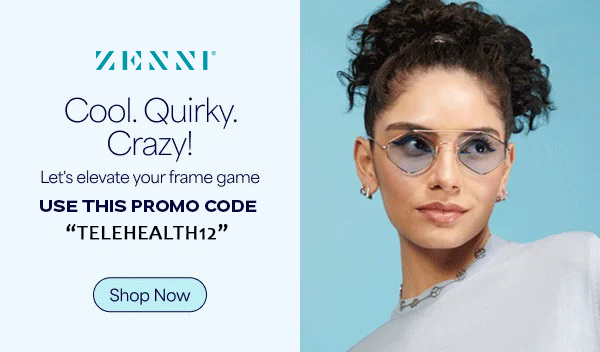1. Correct your vision, thanks to a very complex geometry that not only responds exactly to your visual prescription, but also to all your needs and lifestyles.
2. Protect your eyes from potentially harmful light (UV, blue light, glare) thanks to technologies that help preserve your visual health.
3. Enhance your look with surface treatments that make lenses more transparent and less messy. Against reflections, fingerprints, etc., choose the best coatings for lenses that will provide you with maximum comfort.
A few decisive points for all myopes
- When you are myopic, you expect at least to get out of the blur in the distance, but you also want high-resolution vision that provides precision in details and reliefs and is adapted to all situations. Not all corrective lens geometries are created equal. For example, an Eyezen® lens corrects myopia, our distance vision, but, unlike an ordinary lens, it is also designed for our connected life, and therefore our need for comfort in near vision.
- When you are myopic, the corrective lenses are concave, i.e. they are thicker at the edge than in the centre. If you are concerned about the aesthetic appearance of your glasses, as well as your eyes behind the lenses, you should consider thinned lenses with a high index, which limit the thickness of the lens and the optical effect of shrinking the eye. The thickness of a thinned lens can be reduced by up to 40% compared to an ordinary lens (comparison of the thickness of two Essilor lenses with the same prescription and different indices).
- When you are myopic, unlike your distance vision, your near vision is more than perfect. This is why we are extra-sensitive to all the “defects” that can appear on the lens: reflections, dust, fingerprints, etc. The unrivalled performance of Crizal® coatings frees you from these enemies of vision.
- When you are myopic, you often need to wear your glasses all day, not just to work. That’s why it’s important to make sure you have good protection all day long. Transitions® smart lenses adapt to light and are a practical solution to protect against changes in light: clear indoors and at night, they automatically turn dark outside in the sun.
As Far as Frames Are Concerned, All Styles Are Accessible to Short-Sighted People as Long as They Follow These Few Tips:
- Your myopia is slight, below 1.5 dioptres. The good news is that there are no restrictions on your choice of frames. Drilled frames, extra-wide frames, metal frames, acetate frames… You are spoilt for choice!
- Your myopia is average, up to 6 dioptres. Thanks to thinned lenses, the choice of a frame remains very open to match the style you like. Some frames make it easier to hide any unsightly thickness. Examples: a reasonably sized frame that allows the optician to trim the thickest edge of the optical lens, or an acetate frame with thick edges to hide the edge of the lens.
- Your myopia is high. Choose a frame with small lenses. On the other hand, avoid a so-called pierced frame (without metal or acetate edges) which will not hide the thickness of the lens.
Tell Me What Kind of Myope You Are… and I’ll Tell You Which Lenses to Choose
Antoine, 7 years old, two incisors missing, a first prescription for a small myopia of 0.75 diopters (-0.75).
To correct his myopia, nothing is better than Eyezen® Start lenses, which are suitable for marking a basket, copying the blackboard in class, reading or watching a cartoon on his tablet. The important thing for Antoine is that he can continue to move around as he likes, without worrying about the durability of his lenses. Airwear® Junior is recommended for its lightness and durability. To protect the health of his eyes in the long term, make sure his lenses offer the best UV protection, such as with Crizal® Sapphire™ HR coating.
Julie, 10 years old, is an avid comic book reader. Her myopia has been progressing at a steady rate (one diopter per year) since it appeared three years ago. Today, she is -4.50 diopters.
For Julie, Essilor has developed a solution available on medical prescription to slow the progression of myopia in young children. This is the Essilor Stellest™ lens.
Alexandre, 18 years old, a student with a passion for everything. Between football matches, maths homework and video games, his myopia has progressed slightly, but steadily, since it first appeared. It is associated with a slight astigmatism and his prescription indicates: -2.50 (-0.75) 90°.
To correct Alexandre’s vision, Eyezen® Boost lenses, which are high definition for distance vision and optimised for near vision to relieve his eyes, are the most suitable for his connected life. For his average myopia, the Ormix® material, with an index of 1.6, is recommended. Thinner and lighter, it is aesthetically pleasing and comfortable.
Inès, 23 years old and a keen horse rider, has just graduated as a physiotherapist. Her myopia has (finally!) stabilised at -5.00 dioptres
Eyezen® Start lenses are the best choice to correct her myopia. Because she can’t do without her glasses, Ines needs lenses that give her ultra-precise and comfortable vision at all times of her life, whether she’s seeing far away in the street or checking her Instagram feed. Choosing a material with a slimmed-down index is essential for Ines. If she chooses glasses with a thicker rim, such as an acetate frame, she would be better off with a Stylis® in 1.67, or even a very high index, Lineis®, in 1.74, if she opts for a thin metal frame. Ines rides her bike to visit clients so she doesn’t have to change her glasses all day, and Transitions technology allows her to get through any light situation comfortably. She can even choose the colour she wants to match her frames.
Vincent, 45, a management controller, has been mypic since he was 10 years old. For the past few months, he has had to take off his glasses in order to be able to read his tables of figures: he has become presbyopic.
In order to stop juggling his glasses and to be able to see well both near and far, Varilux® lenses are now the most suitable for Vincent. Because he is often bothered by light pollution, generated by LED lighting or car headlights, a high-performance anti-reflective coating like Crizal® Sapphire™ HR is recommended for Vincent. The light parasites are captured, the lenses are sublimated.
Do you recognise yourself in the profile of Antoine, Inès or Vincent, but still need advice on choosing your glasses? Ask your optician for advice, he will help you to choose the best solution, optically and aesthetically.


